Malcolm Musgrove
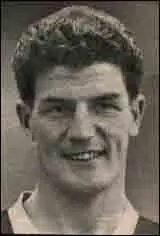
Malcolm Musgrove, the son of a coal miner, was born in Newcastle-upon-Tyne on 8th July 1933. He loved football but he went to Morpeth Grammar School that concentrated on rugby: "I was a county rugby player, under-15s for Northumberland. I played rugby on a Saturday morning for the school, and played football for the village in the afternoon. We used to take a misshapen rugby ball to school so we could play football. Most of us wanted to play soccer but we couldn't take a football. We all used to play at lunchtimes. Most of the team that played rugby also played football." (1)
Musgrove played for his local side, Lynemouth Colliery, before being called up for National Service. While serving in the Royal Air Force he played football for the Scottish football side Sunnybank. Musgrove was scouted by Wally St. Pier and he was persuaded by Ted Fenton to join West Ham United in December 1953. (2)
Musgrove made his debut on 27th February, 1954, when he replaced the regular left-winger, Jimmy Andrews. West Ham lost the game 3-1 to Brentford. "My dad came down to watch my debut. He also was down to watch the village colliery band. They were playing in a big competition at the Albert Hall. We both went to that in the morning. I think I had two kicks and a header and I missed that. I didn't have a very good first game. It seemed to pass me by." (3) Musgrove only had another three games that season. It was not a good start as West Ham failed to win in any of the games he played that season. (4)
Malcolm Musgrove: West Ham United
Malcolm Musgrove was a very fast winger and in the off-season he became a professional athlete. "In the summer I would go back home and run in foot handicaps, sprint races, for money. My dad had been a sprinter. We used to go to meetings around the country, like horse racing it was. I can remember winning one handicap and the prize was £30. At the time I was getting £12 10s a week at West Ham." (5)
The following season he had to wait until the 19th November, 1955, before he replaced Andrews. Musgrove did well and played 21 games and scored 8 goals during the season. However, the 1955-56 season Andrews was the regular number 11 and Musgrove only got 8 games. In 1956 Andrews was sold to Leyton Orient and Musgrove became a fixture in the team. In the 1956-1957 he played 39 league and cup games and scored 9 goals. (6)
Musgrove (nickname Muzzy) admits that he was disliked by some of the supporters: "The fans weren't very good to me at times, when I was going through a bad period. We had a fella, in the Chicken Run, he used to get at me something terrible. I wasn't afraid of going out, but I preferred to play on the stand side for a time. He used to shout: 'I'm here again Muzzy,' and he'd just keep going. The only way you could beat him was to score or win the game. Eventually I won him over. I never met him. He called me Geronimo (because of the shape of my nose)." (7)
Malcolm Allison
Malcolm Allison took over the control of first-team training sessions in 1957. Allison admitted that it was an example of player power: "My relationship with the West Ham manager Ted Fenton was much closer than the one I had had with Jimmy Seed (his manager at Charlton). But it was scarcely satisfactory. I did give him some problems, but they arose chiefly out of my frustration with the way the club was run. And eventually I began to run the team, with his tacit agreement. He could see that I was getting results. Player power is a phrase which has become fashionable in modern football. But it was being practiced in the West Ham dressing room 20 years ago. I began to draw up my own training schedules, and people like Phil Woosnam, Noel Cantwell, John Bond and Frank O'Farrell came in with me." (8)
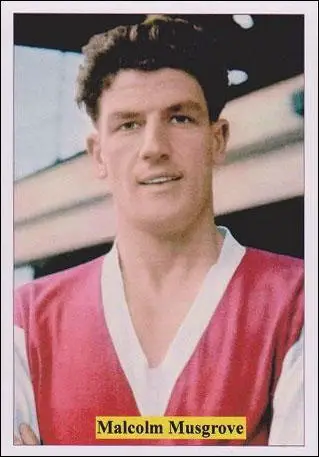
Allison also began picking the team. Mike Grice commented: "Three team sheets would go up for match days. Malcolm would look at them all, take them down and go and see Ted. When they went up again they had invariably changed." Bill Lansdowne recalled: "Fenton would give us a chat and on the way out of the dressing-room Malcolm would say what to do." Allison liked Musgrove because of his attitude towards training: "I was a fitness fanatic, I scored goals, I could run. I was quick and worked 110 per cent. Malcolm Allison was a double fitness fanatic. You finished your day and think that you had earned your money." (9)
The classroom for the "West Ham Academy" was the Cassettari a cafe round the corner from the ground where the players went each day. They talked mostly about football. Malcolm Musgrove was one of those who attended these sessions. According to Malcolm Allison the important thing was for the players to consider a new approach to football. "In a café around the corner from Upton Park we used to fill the room with our theories and disputes. But the result was that we were a nicely developing team. We had opened our minds and declared ourselves willing to try new things and be prepared to make some mistakes on the way." (10) Dave Sexton, also later a successful manager, said: "The sessions at Cassetarri's got really deep and intense. So many ideas came out of them that we took with us after we left the club." (11)
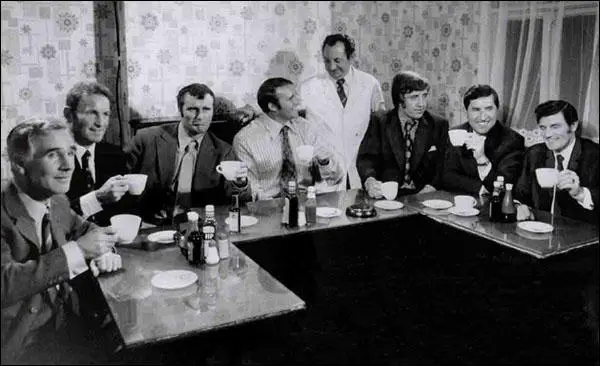
coaches: Jimmy Andrews, Dave Sexton, Noel Cantwell, Malcolm Allison, Phil Cassetarri,
John Bond, Frank O'Farrell and Malcolm Musgrove (10th November, 1971)
Even the players in the youth team used to visit Cassettari’s. John Lyle wrote in his autobiography Just Like my Dreams: My Life at West Ham (1990): "We spent a lot of time together, and frequently ended up after training sharing a pot of tea in an Italian cafe just round the corner from the ground. Cassettari’s was a favourite haunt for West Ham players at the time. It was a family run cafe, and they used to let the senior and young players sit upstairs and talk about football. None of us knew it at the time, but a high percentage of the lads who sat talking football in that little cafe went on to become coaches and managers." (12)
Frank O'Farrell commented that it was very unusual to get a group together that wanted to talk about the game. At first the reception that they got for these new tactics from the fans was lukewarm. "Much of what the players had created seemed strange. The way they played with the ball, especially at the back, made it appear as if they were trying to bait both their opponents and their supporters. These were not the solid, hard-working footballers that East Enders had come to expect. It would have been easy for the club and its manage to put a stop to the experimenting that was taking place at training and on the field and go back to basic football, thus avoiding any possibility of having the worst of both worlds - being unsuccessful and different at the same time." (13)
1957-1958 Season
Musgrove remained in the first team for the 1957-1958 season. West Ham had been in the Second Division since the end of the 1931-1932 season. They began in an unremarkable fashion. By mid-October they only had 12 points from 12 matches. Ted Fenton, felt he needed a new striker and decided that he wanted Vic Keeble who was playing at Newcastle United. He had managed him at Colchester United, and considered him a great finisher. He telephoned Keeble and said: "I'm coming up Saturday, I fancy you Vic, I could well put in a bid for you. I'll take a look at you, see how you do." Keeble scored two goals in the first 45 minutes and at half-time Fenton knocked on the window of the dressing-room and said: "Vic, don't play too well in the second-half, they won't let you go." After the game Fenton bought Keeble for £10,000. (14)
Vic Keeble had been a West Ham fan when he was a boy and so he welcomed a move to the club. (15) Eddie Lewis, who was replaced in the side by Keeble was not impressed by the signing. "After I was dropped I scored four goals in a reserve game... Ted Fenton was obsessed with Vic Keeble, so I just didn't get any games. Ted wasn't the sort of bloke you could talk to about anything." Other players also had their doubts. Mike Grice complained: "Feeble Keeble, the legless wonder... But he was great in the air." Ken Brown added: "Vic Keeble couldn't kick a ball ten yards, but he could head a ball." (16)
Keeble was a great success at West Ham United: "I partnered John Dick and we clicked instantly, scoring 40 goals between us. I was really enjoying my football and grabbed a hat-trick in a 5-0 win against Stoke City, two in 6-1 wins over Lincoln and Bristol Rovers, and further braces in a 6-2 victory over Swansea and 8-0 thumping of Rotherham United. The Hammers clinched the title in the final game at Middlesbrough, where we won 3-1. I knocked in the third goal." (17)
Keeble scored 19 goals that season. Johnny Dick was top scorer with 21 goals and Billy Dare contributed 14, John Smith 11, and Musgrove 9. West Ham was a devastating attacking team scoring a record total of 101 goals that enabled them to win the league championship. After 26 seasons in the second division West Ham was promoted to the top tier. (18)
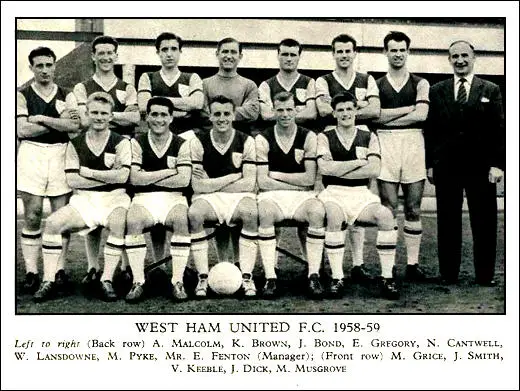
The first team squad tended to live in club houses. This included Malcolm Musgrove, Ken Brown, Eddie Bovington, Eddie Lewis, Johnny Dick, Mike Grice: "Players were all together in those days, most of the club houses were together in the same area. Eddie Bovington was in our area. Eddie Lewis and Mike Grice were down the road. Jackie Dick wasn't too far off in Hainault. I would come out of Aintree Crescent, Barkingside, where I lived, walk down Craven Gardens and that's where Ken Brown lived. I would knock on on his door, when we were travelling to an away game. Joan Brown would go and stay with Jean (Malcolm's wife). There were no cars, we had to take our bags on the bus. Then we'd get another bus and tube to King's Cross." (19)
First Division
West Ham United made a very good start to the 1958-1959 season. As the newcomers to the First Division they took the other teams by surprise. They won their first three games against Portsmouth (2-1), Wolverhampton Wanderers (2-0) and Aston Villa (7-2). This was followed by a draw and a defeat. However, when they played Manchester United on 8th September, 1958, they knew that a victory would take them to the top of the league. (20)
Sam Leitch reported what happened in The Daily Herald the next morning: "What a cheek which was contemptuous West Ham toyed with Manchester United last night and built up a load of three cracker-jack goals in 60 minutes. Then their strolling, lazy genius got them into trouble as United... slammed back. Had the game lasted another ten minutes I think the Busby Babes would have collected a point. Still over confidence or not, the East End boys of London are top of the First Division this morning - after another joy infested night at this tight little London stadium. The permanently demoralised in the first-half of the slick deadlines and inter-changing of the West Ham inside men, Vic Keeble, John Smith and John Dick... Ron Cope and Goodwin tangled repeatedly as they were jolted out of their stride by the crossfield genius of Malcolm, the punch of Musgrove and the gentle, yet deadly, tip-tapping of Keeble and Smith. It was a magic, high-speed move in the 38th minute which scissored that defence again. From Keeble to Dick, for the big Scot to roll it only a yard forward for Smith to blast home from 18 yards." (21)
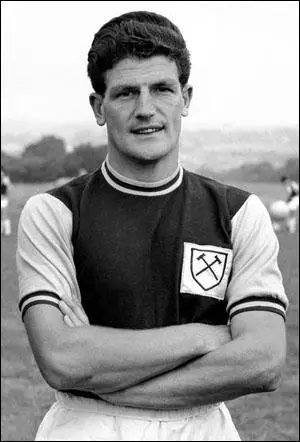
Unfortunately, West Ham could not hold its position at the top of the league and they lost five out of their next seven games. Two wins were followed by two draws and then four defeats. West Ham then went on another good run with eleven wins in 14 games. Except for a 5-1 win over Manchester City, the run in was disappointing and West Ham finished in 6th place. (22) That season Musgrove played in 40 league games and scored seven goals and was voted "Hammer of the Year". (23)
Musgrove was top goalscorer in the 1959-1960 season with 15 goals but the club only finished in 14th place. The following season he was also top goalscorer with 17 goals. Johnny Dick commented: "I had a lot of time for Malcolm Musgrove, one of the unsung heroes of a very good West Ham team. He didn't have the charisma of some of the others, but he was a smashing down-to-earth guy. He was a very special person for me and I still have a great affection for him." (24)
Ron Greenwood replaced Ted Fenton as manager of West Ham United in April 1961. In his autobiography, Yours Sincerely (1984) he recalled: "Malcolm Musgrove was another player I counted myself lucky to have. He was a useful winger and even when he was not at his best he still gave everything. He was always shouting for the ball and trying to lift the performance of others. He had effective days and modest days but he was the sort of player managers warm to. He was a great help to me when I joined West Ham, and later went on to become an excellent coach and chairman of the Professional Footballers' Association... The response from all the players was tremendous, and as Phil Woosnam and Malcolm Musgrove were both full coaches we were able to get right inside the game." (25)
Even in the latter stages of his career, Musgrove retained his speed. In a game against Charlton Athletic the Daily Herald reported: "Only when left-wing sprinter Malcolm Musgrove got into a gallop did half-strength Hammers look lethal in front of goal - and that was late in the second half.... A flying Dick-Musgrove left-wing move brought the winner. John Dick gave Duff no chance from close in." (26)
Despite this praise Greenwood decided to sell Malcolm Musgrove to Leyton Orient in November, 1962. During his time at West Ham he scored 84 games in 283 games. This made him the second highest goalscoring winger in West Ham's history behind the legendary Jimmy Ruffell. In 1962, he became chairman of the Professional Footballers’ Association, remaining in the post for four years. (27)
Musgrove recalled: "When I got to Orient they were bottom of the table. I was supposed to help them out with Bobby Mason, who they bought at the same time from Wolverhampton Wanderers. I scored in my first game, against Newcastle. We won the match. They were good professional footballers at Orient, but they were having a bad time. The further down we went, the more difficult it was to pick ourselves up. We started to look as if we might escape at one point, but we didn't, we got relegated." (28)
Musgrove remained at Leyton Orient until 1966 and in 83 games he scored 14 goals. Musgrove went into coaching and worked at Charlton Athletic, Aston Villa and Leicester City, where he assisted former West Ham teammate Frank O'Farrell in guiding the club to the First Division in the 1970-1971 season. He then joined O’Farrell at Manchester United before becoming a manager in his own right at Torquay United in 1973. (29)
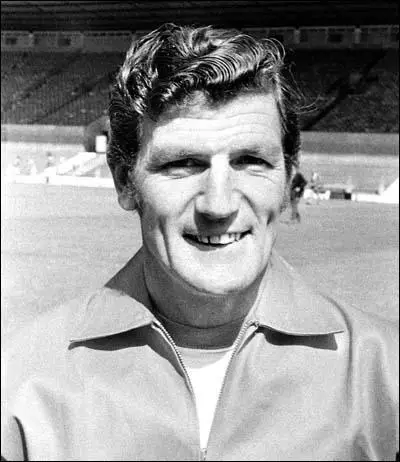
After three years, he moved to the United States to coach the Connecticut Bicentennials and Chicago Sting in the North American Soccer League, before returning to England to manage Exeter City between 1981 and 1984. He retired for a few months but soon found himself coaching at Winchester College for three days a week. (30)
Eventually he moved to Torquay with his wife, Jean, to be nearer their children, David, Martin & Allison, and grandchildren. Musgrove was at this time already suffering the early stages of Alzheimer's disease. (31)
Malcolm Musgrove died on 14th September 2007.
Primary Sources
(1) Malcolm Musgrove, interviewed by Brian Belton, for his book Days of Iron (1999)
I was a county rugby player, under-15s for Northumberland. I played rugby on a Saturday morning for the school, and played football for the village in the afternoon. We used to take a misshapen rugby ball to school so we could play football. Most of us wanted to play soccer but we couldn't take a football. We all used to play at lunchtimes. Most of the team that played rugby also played football...
In the summer I would go back home and run in foot handicaps, sprint races, for money. My dad had been a sprinter. We used to go to meetings around the country, like horse racing it was. I can remember winning one handicap and the prize was £30. At the time I was getting £12 10s a week at West Ham.
(2) Terry Roper & Tony McDonald, West Ham in My Day (2008)
West Ham had a very settled side during their promotion season. Ernie Gregory was an excellent goalkeeper and had gained an England 'B' cap. John Bond - another England 'B' international - and captain Noel Cantwell, who also skippered the Republic of Ireland, were as good as any full-back pairing in the Football League. Ken Brown was very strong and powerful at centre-half and dominant in the air.
In midfield, Andy Malcolm was as hard as nails and young John Smith was a great prospect. Mike Grice and Malcolm Musgrove were fast raiding wingers and they were a perfect foil for the strike partnership of Vic Keeble and John Dick. Bill Lansdowne tended to share the number six position with Malcolm Pike.
(3) Sam Leitch, The Daily Herald (9th September, 1958)
What a cheek which was contemptuous West Ham toyed with Manchester United last night and built up a load of three cracker-jack goals in 60 minutes. Then their strolling, lazy genius got them into trouble as United... slammed back. Had the game lasted another ten minutes I think the Busby Babes would have collected a point.
Still over confidence or not, the East End boys of London are top of the First Division this morning - after another joy infested night at this tight little London stadium. The permanently demoralised in the first-half of the slick deadlines and inter-changing of the West Ham inside men, Vic Keeble, John Smith and John Dick...
The prize duel of the night was between that tough little tornado Andy Malcolm emerging as a master right-half of England class, and inside-left Bobby Charlton, who has never been anything but England class...
Back to the non-stop battering which United took right from the start. Panic in the seventh minute by right-half Freddie Goodwin let the burly Dick storm through to lob a high ball over Gregg's head.
Ron Cope and Goodwin tangled repeatedly as they were jolted out of their stride by the crossfield genius of Malcolm, the punch of Musgrove and the gentle, yet deadly, tip-tapping of Keeble and Smith.
It was a magic, high-speed move in the 38th minute which scissored that defence again. From Keeble to Dick, for the big Scot to roll it only a yard forward for Smith to blast home from 18 yards.
On the 60th-minute mark again those leaden0footed United defenders clustered around and could not pounce quick enough to foil Musgrove leaving Gregg helpless from 20 yards.
(4) Ron Greenwood, Yours Sincerely (1984)
Malcolm Musgrove was another player I counted myself lucky to have. He was a useful winger and even when he was not at his best he still gave everything. He was always shouting for the ball and trying to lift the performance of others. He had effective days and modest days but he was the sort of player managers warm to. He was a great help to me when I joined West Ham, and later went on to become an excellent coach and chairman of the Professional Footballers' Association... The response from all the players was tremendous, and as Phil Woosnam and Malcolm Musgrove were both full coaches we were able to get right inside the game.
(5) The Daily Herald (14th August, 1962)
Only when left-wing sprinter Malcolm Musgrove got into a gallop did half-strength Hammers look lethal in front of goal - and that was late in the second half.
Charlton playing simple, straight-forward Soccer, dominated in the early stages. After seven minutes centre forward Denis Edwards chipped past Lawrie Leslie from close-in, with the West Ham defence flat-footed.
Wingman Ian Crawford cracked home the equaliser off the crossbar after a 20th minute corner.
A flying Dick-Musgrove left-wing move brought the winner. John Dick gave Duff no chance from close in.
(6) Kirk Blows and Tony Hogg, The Essential History of West Ham United (2000)
Malcolm Musgrove holds the distinction of being the second highest goalscoring winger in West Ham's history behind the legendary Jimmy Ruffell. A member of the 1957-1958 Second Division Championship winning team, "Muzzy" was top goalscorer in 1959-60 and 1960-61. Sometimes out of favour with the fans, he was nevertheless voted "Hammer of the Year" in 1959. An original member of the fabled West Ham Cassettari's discussion groups, he transferred to Leyton Orient in 1962 after nine years at the Boleyn. Musgrove showed his prowess as an administrator when he was chairman of the PFA between 1963 and 1966. After retiring in 1966 he was coach at Leicester and Manchester United and then manager of Torquay, later holding posts at Charlton, Aston Villa, Exeter, Plymouth and Shrewsbury when he retired as physio.
(7) Malcolm Musgrove: West Ham United's goalscoring wing wizard (7th July, 2009)
One of the finest wingers in West Ham United history, Malcolm Musgrove, was born on this day in 1933.
A member of Ted Fenton’s 1958 Second Division title winning side, Musgrove was voted Hammer of the Year in 1960, and totalled an astounding 98 goals in 317 goals in Claret and Blue.
The left-sided player was raised in the Northumbria village of Lynemouth, 20 miles north of Newcastle-upon-Tyne, where he began his career with the local Lynemouth Colliery football team.
As a teenager, he was called up for National Service and stationed in north west Scotland in the RAF, and it was while playing for Scottish junior side Sunnybank in Aberdeen that he was scouted and signed by West Ham in December 1953.
Musgrove quickly established himself in Fenton’s team, debuting in a Second Division fixture at Brentford on 27 February 1954. His first goals arrived in December of the same year, when he netted two in a 3-3 draw with Bury at the Boleyn Ground.
Between 1956/57 and 1961/62, Musgrove’s outstanding wing play saw him reach double figures in six consecutive seasons, in addition to creating dozens of goals for his teammates. He played a starring role, for example, by setting up goal after goal in the record 8-0 thrashing of Rotherham United in March 1958.
In 1957/58, he played 39 times and found the net on nine occasions in the Second Division as the Irons ended their 26-year absence from the top flight in style, including a goal in the title-clinching 3-1 win at Middlesbrough on the final day of the season.
After helping the Hammers to finish sixth in the First Division in 1958/59, Musgrove hit top form the following season, scoring 15 league goals and 19 in total on his way to being voted Hammer of the Year.
Musgrove finished as West Ham’s leading First Division scorer in 1960/61, with 17 goals in 40 appearances, and he added 13 more in 1961/62 following the appointment of Ron Greenwood as manager.
In 1962, he became chairman of the Professional Footballers’ Association, remaining in the post for four years.
December 1962 saw Musgrove depart the Boleyn Ground after nine years, as he moved the short distance to Leyton Orient, who had been promoted to the First Division for the first time in their history the previous season.He remained at Brisbane Road for three years before taking up coaching roles at Charlton Athletic, Aston Villa and Leicester City, where he assisted former West Ham teammate Frank O’Farrell in guiding the Foxes to the First Division in 1970/71.
He then joined O’Farrell at Manchester United before becoming a manager in his own right at Torquay United in 1973. After three years, he moved to the United States to coach the Connecticut Bicentennials and Chicago Sting in the NASL, before returning to Devon to manage Exeter City between 1981 and 1984.
A nomadic career saw him work as a physio in Qatar and for Plymouth Argyle, before he joined another former Hammers teammate, John Bond, and helped Shrewsbury Town win the Third Division title in 1993.
In later life, he retired to Torquay with his wife Jean, with whom he had three children, David, Martin and Allison.
Malcolm Musgrove passed away in September 2007, aged 74, but his mesmeric, prolific play in a West Ham United shirt will never be forgotten.
References
(1) Malcolm Musgrove, interviewed by Brian Belton, for his book Days of Iron (1999) page 92
(2) Tony Hogg, West Ham United Who's Who (2005) page 151
(3) Malcolm Musgrove, interviewed by Brian Belton, for his book Days of Iron (1999) page 100
(4) John Northcutt, The Definitive West Ham United F. C. (2003) page 69
(5) Malcolm Musgrove, interviewed by Brian Belton, for his book Days of Iron (1999) page 92
(6) Kirk Blows and Tony Hogg, The Essential History of West Ham United (2000) pages 273-274
(7) Malcolm Musgrove, interviewed by Brian Belton, for his book Days of Iron (1999) page 101
(8) Malcolm Allison, Colours of my Life (1975) page 30
(9) Malcolm Musgrove, interviewed by Brian Belton, for his book Days of Iron (1999) page 101
(10) Malcolm Allison, Colours of my Life (1975) page 32
(11) Dave Sexton, interviewed by Brian Belton, for his book Days of Iron (1999) page 224
(12) John Lyle, Just Like my Dreams: My Life at West Ham (1990) page 29
(13) Charles Korr, West Ham United: The Making of a Football Club (1986) page 108
(14) Brian Belton, Days of Iron (1999) page 141
(15) Vic Keeble, Match of My Life (2007) page 30
(16) Brian Belton, Days of Iron (1999) page 141
(17) Vic Keeble, Match of My Life (2007) page 41
(18) Kirk Blows and Tony Hogg, The Essential History of West Ham United (2000) page 275
(19) Malcolm Musgrove, interviewed by Brian Belton, for his book Days of Iron (1999) pages 100-101
(20) John Northcutt, The Definitive West Ham United F. C. (2003) page 74
(21) Sam Leitch, The Daily Herald (9th September, 1958)
(22) John Northcutt, The Definitive West Ham United F. C. (2003) page 74
(23) Kirk Blows and Tony Hogg, The Essential History of West Ham United (2000) page 106
(24) Johnny Dick, interviewed by Brian Belton, for his book Days of Iron (1999) pages 100-101
(25) Ron Greenwood, Yours Sincerely (1984) page 176
(26) The Daily Herald (14th August, 1962)
(27) Kirk Blows and Tony Hogg, The Essential History of West Ham United (2000) page 106
(28) Malcolm Musgrove, interviewed by Brian Belton, for his book Days of Iron (1999) page 220
(29) Malcolm Musgrove: West Ham United's goalscoring wing wizard (7th July, 2009)
(30) Brian Belton, Days of Iron (1999) page 221
(31) Malcolm Musgrove: West Ham United's goalscoring wing wizard (7th July, 2009)
